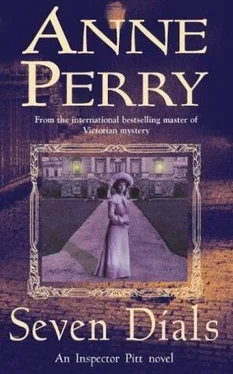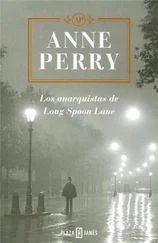Narraway’s mouth twisted in a hard grimace. “Presumably she was the one who called the police, or had her servant do it. If it was in revenge for the massacre, then he will have been party to it.”
Narraway’s dark face was heavy with foreboding. He stared straight ahead at some horror he could see within his own vision. “I assume they are calling this witness on Monday?” he said without turning to Pitt.
“I should think so,” Pitt replied. “It will prove intent.”
“And then she will take the stand and tell the world exactly why,” Narraway went on in a low, hard voice. “And the newspapers will rush to repeat it, and within hours it will be all over the country, then all over the world.” His face looked bruised, almost as if he had been beaten. “Egypt will rise in revolt and make the Mahdi and the whole bloodbath of the Sudan look like a vicarage tea party. Even Gordon in Khartoum will seem a civilized difference between peoples. And inevitably we shall lose Suez.” He clenched his fists, his shoulders tight. “God! What a hellish fiasco. We were damned from the start-weren’t we!” It was not a question, just an exclamation of despair.
“I don’t understand it,” Pitt said slowly, feeling his way in a darkness of disjointed reason. “Why now? And if the purpose behind her coming to London, drawing in Ryerson, the whole business of trying to get the cotton manufacturing back into Egypt, the murder of Lovat, was in order to expose the massacre… then why all that trouble?” He stared at Narraway. “Why not simply make it known in Egypt? The facts are there. The bodies could be found and exhumed. With thirty-odd people shot to death, even after the burning, some of them will have bullet holes, chips in bone to show it wasn’t simply an accidental fire. Why all this murder and trial? Why risk her own life at all? If they know about the massacre, surely the murder of one of the soldiers responsible is trivial, almost an irrelevance, compared with exposing it? It’s ridiculously inefficient like this.”
Narraway stared at him, his eyes widening. “What, exactly, are you saying, Pitt? That she is being used by someone else? Expendable?”
“I think so… yes,” Pitt agreed. “What use is it to anyone to involve Ryerson?”
“Publicity,” Narraway said instantly. “The murder of one junior diplomat is neither here nor there. It’s Ryerson’s involvement that has journalists from every country in Europe writing about it. If the massacre comes out in the Old Bailey, you can be sure not only will all Britain know about it, and all Egypt, but most of the rest of the world as well. We wouldn’t have a chance in hell of keeping it quiet. Not only will all of the violence and horror of the event itself come out, but every stupid and ugly thing anyone has done since to conceal it.”
“So she came believing she was trying to help the cotton industry, but whoever it was who sent her intended this all the time?” For Pitt it was now only half a question. At last it made sense of what he had learned of Ayesha in Alexandria. This was the woman he had discovered. And once again she had been betrayed, only this time it would cost her her life. There was only one question now. “What did they tell her to persuade her to kill Lovat?” he said aloud. “Or didn’t she?”
Narraway stared at him, amazement, then comprehension, in his face. “I don’t know,” he said at last. “If she didn’t, then who did?”
Pitt stood up. “I don’t know.” Anger seethed inside him for Ayesha, for Ryerson, who unquestionably had been used, for all the people who were going to be driven into the maelstrom that Egypt would become. The beauty and the warmth of Alexandria would be shattered, as would the lives of the men and women whose faces he had seen when he was there, without even knowing their names. And he hated not knowing, and having his emotions pushed and pulled, and then torn apart by pity for first one, and then another, and not knowing what to believe. “Give me the authority I need to go and see her.” That was a demand, not a request.
“I can’t get it until the morning,” Narraway replied. “You’ll need it in writing,” he added as Pitt hesitated. “She’s not guilty yet, and she has rights. The Egyptian embassy will still protect her. I’ll have it for you by tomorrow afternoon.”
Pitt accepted it because he had no choice.
THE NEXT DAY, after a restless night in which the little sleep he got was filled with dreams of violence and almost unbearable tension, he was at Narraway’s house by noon. He was obliged to wait nearly two hours alone in the morning room until Narraway returned with a piece of paper in an envelope, and gave it to him without explanation.
“Thank you.” Pitt took it, glanced at the few lines of writing on it and was impressed, although he had no intention of allowing Narraway to know that. “I’ll go straightaway.”
“Do,” Narraway agreed. “Before they change their minds. And Pitt… be careful. The stakes could be as high as war. The people behind all this are not going to be squeamish about getting rid of one policeman more or less.”
Pitt was jolted, in spite of himself. “I know that!” he said sharply, then turned and left, calling a good-bye over his shoulder so Narraway should not be aware how ugly and deep his thoughts had become. He had faced physical danger before. No one could patrol the back alleys of London as he had done without it. But this was a different venture, a conspiracy of a magnitude he had not tasted before. It was no one man’s ambition but a nation’s fate which could erupt in death and awful, senseless destruction.
He took the first hansom that passed and told the driver to take him as rapidly as he could to Newgate. As soon as he was there he went straight to the warden in charge and showed him the paper Narraway had given him. The man read it right through twice, and then consulted with a superior. Finally, when Pitt was about to lose his temper, he conducted him to the cell where Ayesha Zakhari was held, and unlocked the door.
Pitt stepped in and heard the steel clang behind him. The woman who turned to face him startled him so profoundly he was robbed of words. He had created a mental picture of her from his expectations, and from the Greek Alexandria he had seen. Perhaps old stories of the city had touched his imagination without his being aware of it. He had pictured someone olive-skinned with lustrous dark hair, rich and sultry, with a softly curving body, perhaps average height or less.
She was very tall, only three or four inches less than he, and slender, delicately boned. She wore a pale silk gown like those he had seen on women in Alexandria, but more graciously cut. But most extraordinary of all, her skin was almost black and her hair was no more than a dark, smooth covering for her perfectly shaped head. Her features were more than beautiful; they were so exquisite she seemed like a work of art, and yet the vitality in her made her obviously a living, breathing woman. She was not an Egyptian of the modern, sophisticated Mediterranean Islam; she was of ancient, Coptic Africa-not Cleopatra at all, but older than that, Nefertiti.
“Who are you?” Her voice jolted him back to the present. It was low and a little husky, but with hardly any accent he could place, only a slightly more precise diction than an Englishwoman would have had, other than perhaps Great-aunt Vespasia.
“I apologize,” he said without thinking. “My name is Thomas Pitt. I need to speak with you, Miss Zakhari, before the court resumes on Monday morning. Certain things have transpired of which you may not be aware.”
“You may tell me whatever you wish,” she replied levelly. “I have nothing to tell you, beyond what I have already said. And since I cannot prove it, there is little purpose in my repeating it. You are wasting your time, Mr. Pitt, and you are wasting mine also. And I think perhaps I do not have very much of it left.” It was said without self-pity, and yet he could see in her face that underneath the effort of courage there was immeasurable pain.
Читать дальше












